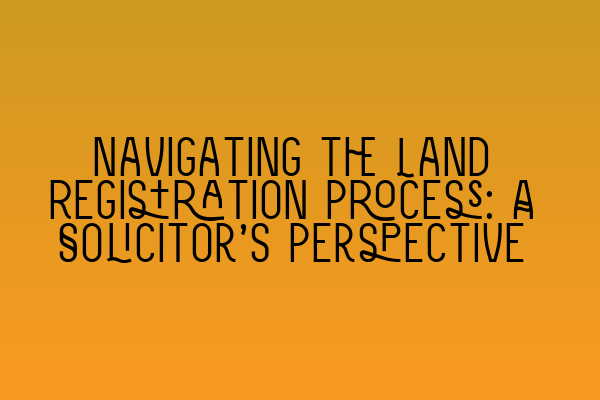Navigating the Land Registration Process: A Solicitor’s Perspective
The land registration process can be complex and confusing, especially for those who are unfamiliar with it. As a solicitor at SQE Property Law & Land Law, I have helped numerous clients in successfully navigating this process. In this blog post, I will provide you with a comprehensive guide on how to navigate the land registration process, giving you insights from a solicitor’s perspective.
Key Steps in the Land Registration Process
The land registration process typically involves several key steps. Understanding these steps will help you navigate the process more effectively and ensure a smooth and successful registration. Let’s dive into these steps:
1. Preparing the Application:
Before starting the land registration process, it is crucial to prepare the application thoroughly. This includes gathering all the necessary documents, such as the title deeds, plans, and any other supporting documents. These documents should be reviewed by a solicitor to ensure accuracy and completeness.
2. Completing the Application Form:
The next step is completing the land registration application form. This form requires detailed information about the property, its boundaries, and any existing interests or rights that may affect the registration. It is essential to provide accurate and up-to-date information to avoid any future complications.
3. Submitting the Application:
Once the application form and supporting documents are complete, they need to be submitted to the Land Registry. It is crucial to pay attention to submission deadlines and any specific requirements set by the Land Registry. This ensures that the application is filed promptly and reduces the risk of delays or rejection.
4. Examination by the Land Registry:
After receiving the application, the Land Registry will examine the submitted documents and verify the information provided. They may request additional documentation or clarification if needed. It is important to respond promptly to any queries raised by the Land Registry to avoid unnecessary delays.
5. Title Investigation:
During the land registration process, the Land Registry will conduct a title investigation. This involves verifying the ownership of the property, checking for any existing burdens or restrictions, and ensuring that the property is legally marketable. This investigation helps ensure the integrity of the land registration system.
6. Issuance of the Title Certificate:
Upon successful completion of the title investigation, the Land Registry will issue a title certificate. This certificate serves as evidence of ownership and provides important information about the property, such as its boundaries and any registered interests. It is essential to review the title certificate carefully to ensure its accuracy.
7. Updating the Land Register:
After receiving the title certificate, it is necessary to update the land register with the new information. This includes updating the ownership details, any changes to the property boundaries, and any registered interests. Properly updating the land register is crucial to maintaining an accurate and up-to-date record of the property.
Navigating the land registration process can be a complex undertaking. Hiring an experienced solicitor can significantly simplify the process and ensure its successful completion. At SQE Property Law & Land Law, our expert solicitors provide comprehensive assistance throughout the land registration process, ensuring a smooth and efficient experience for our clients.
In conclusion, the land registration process requires careful attention to detail and a thorough understanding of the legal requirements. By following the steps outlined in this guide and seeking the assistance of an experienced solicitor, you can navigate the process successfully. If you need further guidance or professional assistance, don’t hesitate to reach out to SQE Property Law & Land Law.
Related Articles:
– SQE 1 Practice Exam Questions
– SQE 1 Practice Mocks FLK1 FLK2
– SQE 2 Preparation Courses
– SQE 1 Preparation Courses
– SRA SQE Exam Dates
